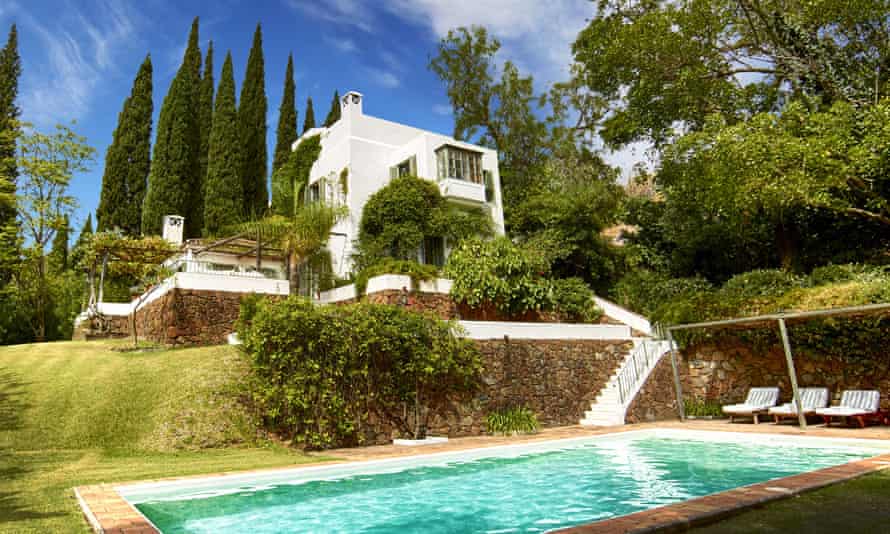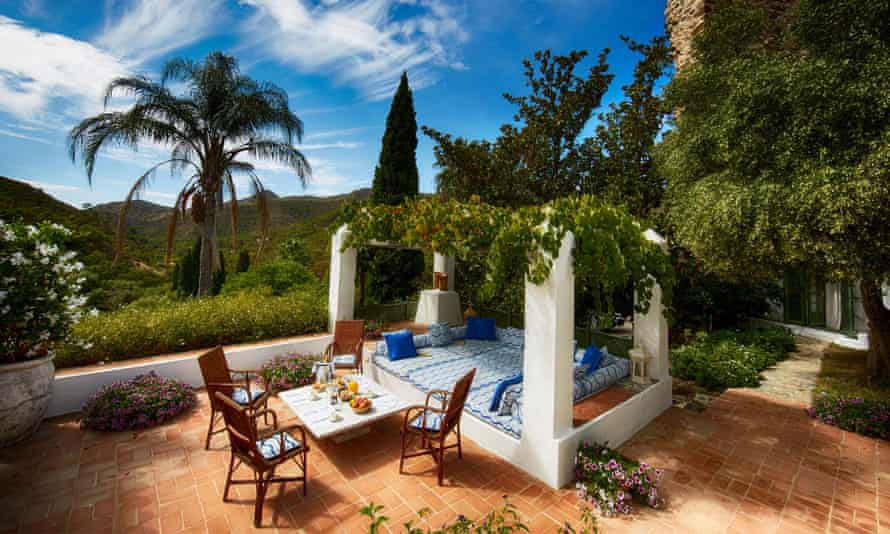Boris Johnson holiday villa linked to Zac Goldsmith firms accused of tax evasion
The luxury villa where Boris Johnson stayed on holiday last month is linked to Costa del Sol property businesses owned by Zac Goldsmith’s family that engaged in a multimillion-pound tax evasion scheme, according to Spanish courts.
Court papers obtained by the Guardian show tax inspectors ordered two property companies owned by the Goldsmith family to pay €24m (£20m) in unpaid taxes and fines after investigating what they said was a suspicious property deal.
The tax authority’s findings have been upheld by one of Spain’s highest courts, with judges agreeing the companies effectively engaged in a deliberate effort to evade tax and committed “serious†violations of the law.
Documents indicate Spanish authorities are still seeking to recover the funds and could even seize parts of the family’s land, which is spread across more than 600 hectares (1,480 acres) of private woodland about 10 miles from the Marbella coastline.
A Swiss lawyer for one of the companies denied the case amounted to a “tax evasion†issue, describing it as a dispute that resulted from a mistaken land valuation by Spanish tax authorities. She said the finding against her client was “extremely hard to understand, to put it mildlyâ€. Court papers indicate there will be a further appeal.
However, the revelation raises difficult questions for the prime minister, who has already faced criticism for refusing to declare his use of the luxury property in the MPs’ register of interests, which would require him to disclose the monetary value of the gift from the Goldsmith family.

Downing Street has insisted the holiday at the villa, which costs £25,000 a week to rent, was “unconnected with the PM’s parliamentary and political activitiesâ€. Zac Goldsmith, a Conservative minister, is a longstanding friend of Johnson and his wife, Carrie. In 2019, Johnson personally appointed Goldsmith to the House of Lords after his friend lost his seat as an MP.
Johnson is now likely to be asked how much he knew of the Spanish tax investigation into companies owned by the Tory minister’s family before staying at their villa, which is in a secluded corner of an estate beside swimming pools, a tennis court and an organic farm.
The revelations raise questions for both Goldsmith, a senior minister, and his brother Ben, a non-executive director at the environment department, about the extent to which they were aware of or involved in the property deal .
Goldsmith family property portfolioNeither brother responded in detail to questions about the extent of their knowledge or involvement in the transactions at the heart of the tax investigation. In an email, Ben Goldsmith said: “This whole thing serves as a warning to any Brit thinking of owning a property in Spain.â€
The Goldsmith brothers inherited their wealth from their father, Sir James Goldsmith, who died in 1997 with a £1.2bn fortune. Goldsmith senior’s wealth now resides in a discretionary trust run for the benefit of his children.
The family first acquired the Tramores estate, the site of the villa where Johnson stayed, in the 1980s. By 1999, the Goldsmiths are understood to have used a company linked to a Cayman Islands structure to acquire additional land bordering the villa, effectively expanding their estate.
More recently, separate Goldsmith-owned offshore companies have been used to own the patchwork of land and properties, which are all situated in the same hills surrounding the quiet mountain village of BenahavÃs.
The Swiss lawyer, who represents one of the companies accused of evading tax, Guadalmansa Administraciones, said the villa where Johnson stayed was “entirely separate†from the property ensnared in the tax dispute.
However, while the villa Johnson stayed in was not owned by a company involved in the tax investigation, public records suggest it forms part of the Goldsmiths’ wider sprawling property holdings in BenahavÃs.
It is unclear why Zac Goldsmith has only declared one of at least three companies that own parts of his family’s land outside the village. The Lords register of interests lists only a Spanish and Maltese company as holding an interest in land in AndalucÃa.
But documents suggest a more complex trust structure has been used to hold land in the area and generate income from holiday rentals, including companies that have not been declared. A spokesperson for the peer insisted: “All reportable interests have been correctly and transparently declared.â€
Map of villa locationsSpain’s tax agency first began investigating the Goldsmith family’s companies in 2012. Inspectors homed in on an unusual property deal when one of the companies transferred land on a large estate to a related company.
According to court papers, in 2008 â€" two years before Goldsmith became an MP â€" the minister’s family segregated parts of its land near BenahavÃs village and transferred it from one of their companies â€" Guadalmansa Administraciones â€" to another called Benaltos Inversiones in exchange for satisfying a €5m debt owed to the company.
However, inspectors alleged the debt was in fact “fictitious†and the companies should have treated the transaction as a “profitable transfer†rather than a debt repayment. They alleged the transaction significantly undervalued the land, which they estimated was in fact worth €23.2m.
After a year-long investigation, the agency ordered the companies to pay a combined €24m in unpaid taxes, interest and penalties. It alleged the companies had violated a law requiring the transfer of assets between related parties to be valued at their normal market value.
Crucially, inspectors alleged the companies failed to properly declare the financial gains arising from the transfer by filing inaccurate tax returns.
In 2016, Spain’s central economic-administrative court (CEAT) rejected an appeal by the companies against the agency’s decision.
Lawyers for the companies had argued the €5m debt owed by Guadalmansa to Benaltos was genuine and a valuation of the property commissioned by the tax agency was flawed. They claimed the fines were disproportionate.

The court, however, accepted the debt was artificial and not a normal commercial arrangement, noting that “several companies domiciled in tax havens†were involved “for no apparent economic reasonâ€.
The court also accepted the tax agency’s valuation of the property and noted that just eight months after the transfer the land was used as security for a loan and valued at €23m. According to the ruling, there was “no doubt†Benaltos was guilty and its improper actions had “resulted in a loss to the public treasuryâ€.
Two years later, one of Spain’s highest courts, the audiencia nacional, upheld the tax court’s ruling. Documents suggest a further appeal has been filed before Spain’s supreme court, but the companies can only appeal against the 2018 ruling on a point of law rather than on the facts of the case.
The Swiss lawyer representing Guadalmansa maintains the Spanish tax agency significantly overvalued the property. It said the assessment was “based entirely on one wildly aberrant valuation†by an agency-appointed valuation company which has since acknowledged they “made a mistakeâ€.
It added: “The purchase was proper, and all taxes associated with the property have always been paid in full.â€
Meanwhile, the two Goldsmith companies investigated by tax authorities appear to be in financial jeopardy. Both were placed into voluntary insolvency in 2019. Documents suggest that by April last year, as a result of the dispute, they owed more than €20m to their biggest creditor: the Spanish state.
Get in touch
0 Response to "Boris Johnson holiday villa linked to Zac Goldsmith firms accused of tax evasion"
Post a Comment